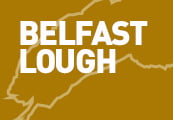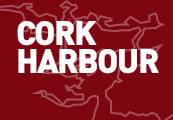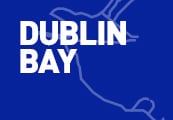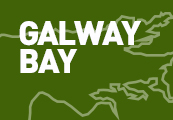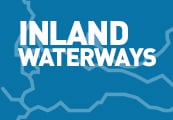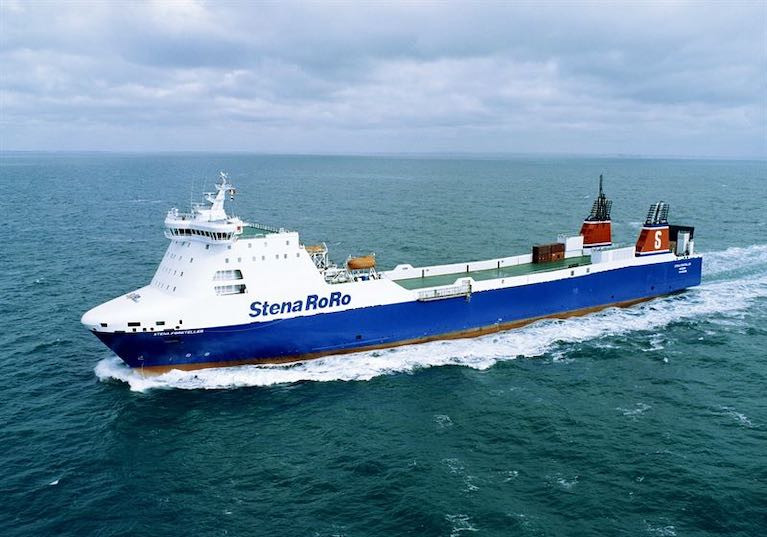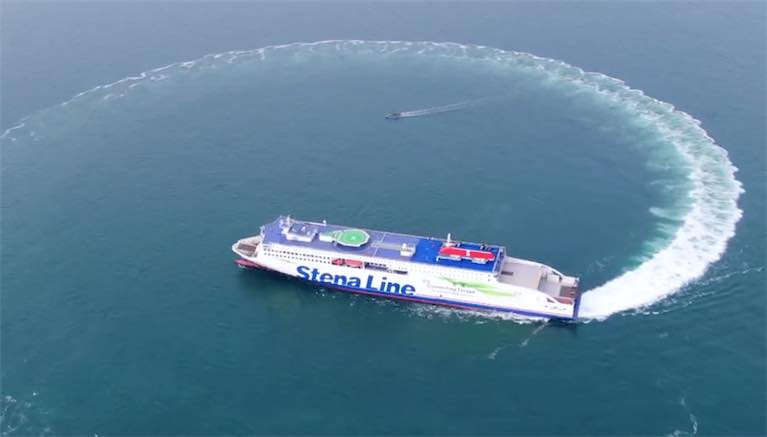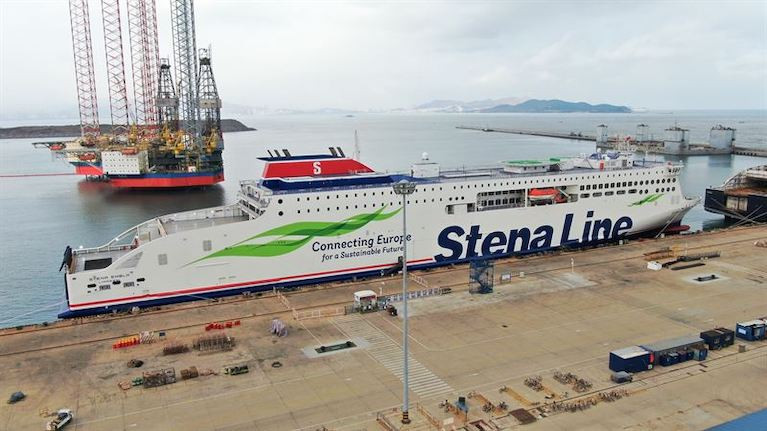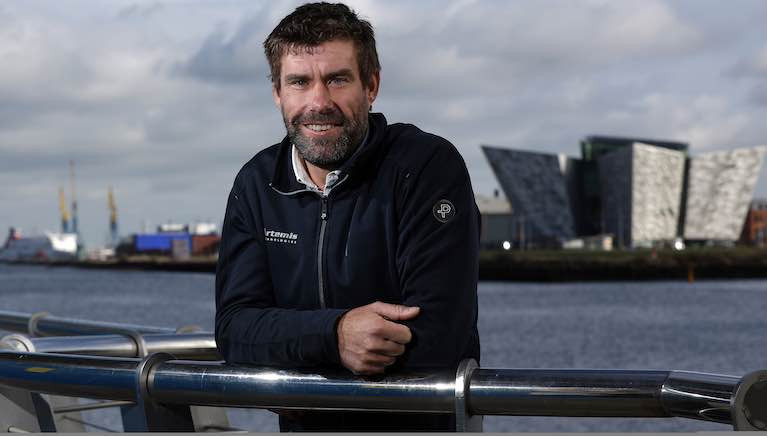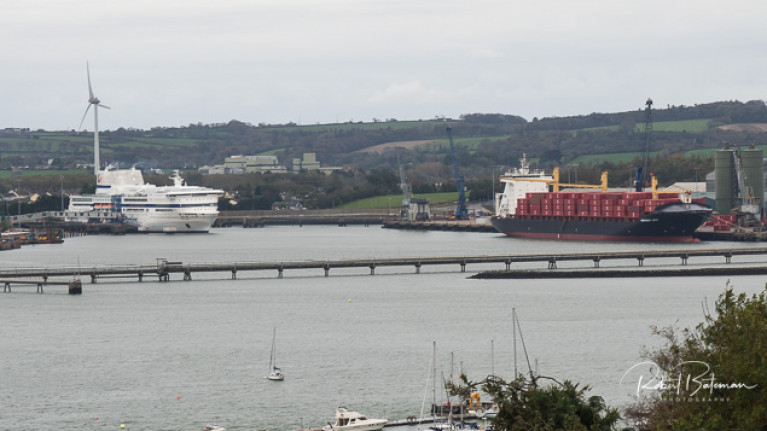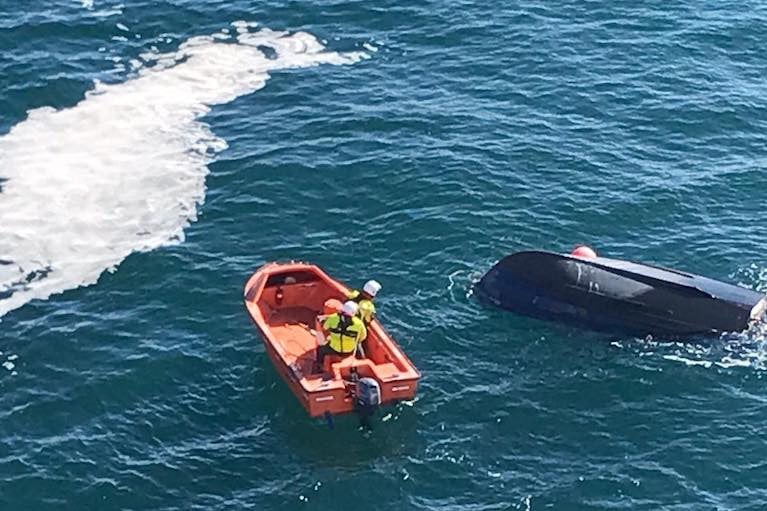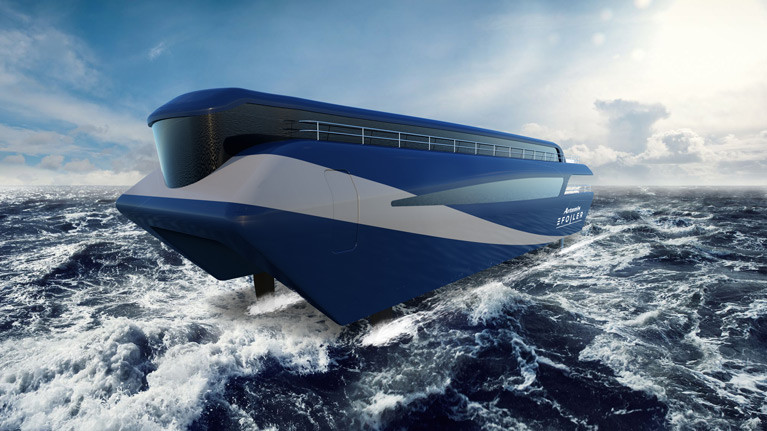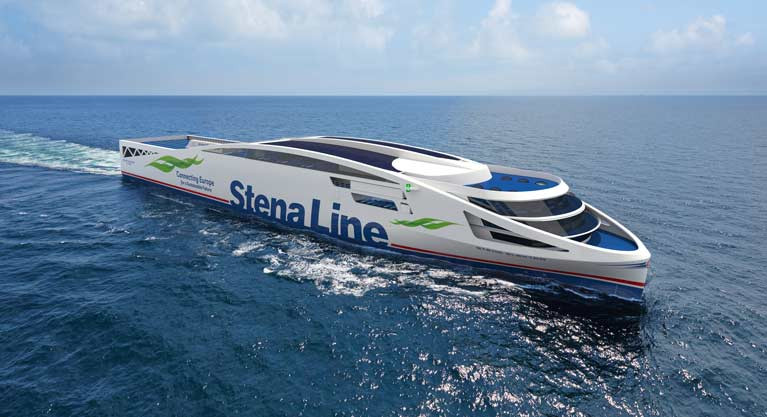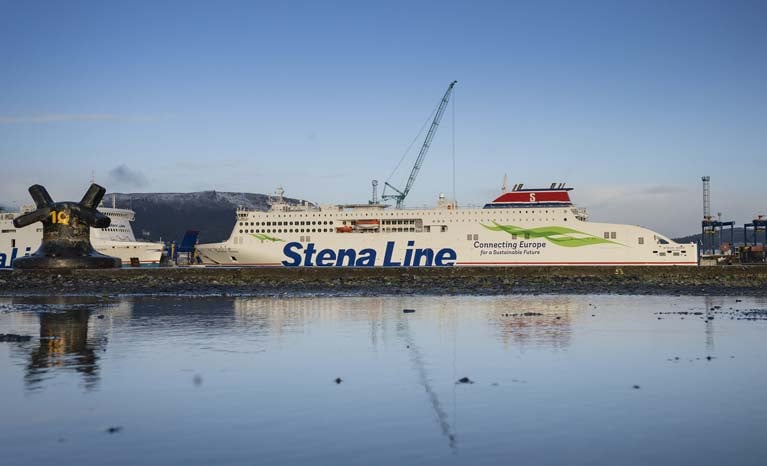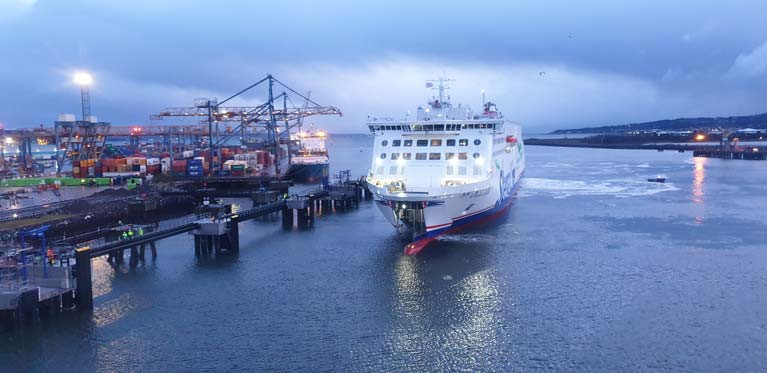Displaying items by tag: ferry
Stena Line Doubles Frequency & Capacity on Rosslare - Cherbourg Route
Stena Line has today announced that it will add an additional freight-only vessel to its Rosslare to Cherbourg route from 4th January 2021. The Stena Foreteller will join the Stena Horizon which already operates on the route, doubling the freight capacity as well as the frequency of sailings between Ireland and the Continent.
The Rosslare to Cherbourg service is an increasingly important freight link between Ireland and the Continent. Stena Foreteller will provide an additional 3,000 lane metres of freight capacity per trip and can accommodate a mix of accompanied and unaccompanied traffic with onboard facilities for up to 12 freight drivers.
Niclas Mårtensson, CEO Stena Line said: “We have been listening carefully to feedback from our customers and it has become clear that there is demand for increased frequency on the Rosslare-Cherbourg service, the shortest direct crossing between Ireland and France.”
“One of Stena Line’s key strengths is our ability to utilise our fleet and be flexible and responsive to market opportunities and changes. On the Irish Sea, we are very well positioned to cover the requirements of the freight and logistics sector with a choice of six routes serving Britain and Europe via landbridge or our direct crossings to France.”
“Now with 12 weekly crossings connecting Rosslare and Cherbourg and up to 240 sailings per week throughout the Irish Sea region, we offer transport organisations and their customers the flexibility, availability and reliability required to get their goods to market in the most convenient way.”
Glenn Carr, General Manager, Rosslare Europort said “we warmly welcome Stena Line’s decision to double Rosslare to Cherbourg services from the beginning of 2021. It reflects the strength of the partnership between Rosslare Europort and Stena Line in providing shipping solutions to Irish industry, and the commitment of Stena Line reinforces our ambitious commitments to continue the development of port facilities, infrastructure and technology under the Strategic Plan and Masterplan for the port. Rosslare Europort is now firmly Ireland’s Gateway to Europe and a central strategic link connecting the country and the European continent.”
Stena Line is the largest ferry operator on the Irish Sea, with the biggest fleet offering the widest choice of routes including, combined passenger and freight services from Belfast to Cairnryan, Heysham and Liverpool, Dublin to Holyhead, Rosslare to Fishguard and the direct service from Rosslare to Cherbourg.
Stena Ferry Line Calls for Brexit 'Implementation Phase'
Stena Line says while today’s news on the Withdrawal Agreement is positive, the ferry company hopes it helps ease the way to agreeing on a Trade Deal. Clarity on Northern Ireland is only one part of Brexit and there remain many unanswered questions.
Ian Hampton, Executive Director and Stena's Brexit Spokesperson says the systems and infrastructure required for customs checks in Northern Ireland and the rest of the UK will also not be finalised in time for 1st January 2021. With many companies in the supply chain still not ready we believe a further ‘implementation phase’ is required by both the UK and the EU.
Stena Line says it understands that the UK Government will undertake a flexible and pragmatic approach to customs requirements after the end of transition period. The Government has chosen to delay, by six months, the imposition of full controls on most imports to Great Britain. This is an approach that the company welcomes, as it will ensure there are no delays in UK ports.
 Ian Hampton, Executive Director and Brexit Spokesperson, Stena Line
Ian Hampton, Executive Director and Brexit Spokesperson, Stena Line
Stena Line would like to encourage the EU to take the same approach as the UK. It is in the interests of the both the UK and EU to prioritise trade flows over customs and agri-food checks at the border. The goods being transported will change little in the short-term, and with the UK adopting all EU rules, there will be little risk after the 1st January, 2020. We would like to encourage both parties to continue to work together as they have done up until now, until systems are ready.
It is vital the UK’s role as a land bridge (the route that connects the Republic of Ireland to the rest of the EU via Great Britain and vice versa) continues. Freight logistics networks are geared around processing and distribution centres in the UK’s central corridor, that feed the supply of goods across Britain, Ireland and the Continent. These centres process goods for distribution for sectors such as retail and pharmaceuticals. They have been set up as part of the land bridge network and can’t simply be by-passed by a direct route, as you then miss out a key part of the network. The land bridge remains the shortest route for Irish goods to enter the EU market, and vice versa, so it is particularly vital for Ireland that the EU plays their part to keep freight moving through Britain and on to the Continent.
Stena Embla to Start Sailing Between Britain & Ireland in the New Year
Swedish ferry company Stena Line has officially taken ownership of its newest ferry, Stena Embla, following a handover ceremony in Weihai, China. The vessel is the third of five new next-generation E-Flexer RoPax vessels that are being constructed at the CMI Jinling Weihai Shipyard, as part of an extensive modernisation of the company’s fleet. It is last of three new vessels due for the Irish Sea, which marks the end of a 7-year development programme totalling a £400m investment in new ferries and port infrastructure in the region
The vessel will now embark on a six-week journey to the UK and Ireland, where it will begin service in January 2021, joining its sister vessels, the other two new E-Flexer ferries built in Weihai, Stena Estrid and Stena Embla, which started in operation in earlier this year.
Due to the pandemic the handover was a lower key affair than previous vessels with Stena Embla’s Senior Master Neil Whittaker, and his team, taking delivery in China. While Stena Line’s CEO Niclas Mårtensson joined remotely from the firm’s headquarters in Gothenburg, Sweden.
 Stena Embla's Senior Master Neil Whittaker
Stena Embla's Senior Master Neil Whittaker
“Today marks the end of 7 years hard work,” said the company’s COO Peter Arvidsson, “so we are delighted to take ownership of the third new ship on schedule. With the new crew in place they can start the long journey to the Irish Sea, where Stena Embla will begin serving customers in the UK and Ireland.”
Niclas Mårtensson said the delivery of Stena Embla marks the end of a very difficult year for the firm: “Taking ownership of Stena Embla is a major milestone for Stena Line, as we look forward to better times ahead” said Mr Mårtensson. “While delivery of the vessel marks the end of a very tough period for us, it also marks the completion of a very significant investment in our Irish Sea operations. It reflects our strong support for the region that will see three of the world’s most modern ferries operating between Britain and Ireland. We recently celebrated the 25th anniversary of the relocation of our Northern Ireland operations to Belfast and 25 years since we commenced the Holyhead to Dublin route. Our three new ferries in the region is a sign of our strong commitment to another 25 years on the Irish Sea” he added.
 Stena Embla Sky Bar
Stena Embla Sky Bar
The new Stena Line E-Flexer ships are amongst the most advanced and fuel-efficient vessels in operation and are much larger than today’s standard RoPax vessels (*details below). At 215 metres in length, Stena Embla will provide freight capacity of 3,100 lane metres, meaning a 40% increase in freight tonnage, and the space to carry 120 cars and 1,000 passengers and crew.
The remaining two E-Flexer vessels under construction in China are even larger versions with a total length of 240 metres. The destination of the as-yet-un-named ferries has not yet been revealed.
STENA EMBLA FACTS
The name Embla is connected to Stena Line’s Scandinavian heritage. It is an Old Norse name. In Norse mythology, it was the name of the first woman. Its origin comes from the Old Norse word for 'elm'.
- Builder CMI Jinling Weihai Shipyard (Weihai, China)
- Type Ro-Pax ship
- Ferry route/home ports Birkenhead (Liverpool) – Belfast
- Operator STENA LINE
- Speed 22 kn / 41 kph / 25 mph
- Length (LOA) 215 m / 705 ft
- Beam (width) 28 m / 92 ft
- Gross Tonnage 42,400 gt
- Lane Metres 3,100
- Passengers 1,000
- Cars 120
- Freight vehicles 210
- Cabins 175
Stena Line is the largest ferry operator on the Irish Sea, offering the biggest fleet and the widest choice of routes between Ireland and Britain including Dublin to Holyhead, Rosslare to Fishguard, Belfast to Cairnryan, and the Belfast to Liverpool and Heysham routes, a total of 232 weekly sailing options. Stena Line also offers a direct service from Rosslare to Cherbourg with three return crossings a week, which is increasing to 7 crossings every fortnight from 1st January 2020.
Belfast Lough Artemis Fast Ferry Boss Iain Percy Salutes UK's 'Green Industrial Revolution'
In response to the announcement by the Prime Minister Boris Johnson of a ten-point plan for a Green Industrial Revolution, Dr Iain Percy OBE, CEO, Artemis Technologies said:
“The Prime Minister’s blueprint for a ‘Green Industrial Revolution’ is a welcome boost to industries such as maritime as we aim to build a more sustainable future, and aligns with our plans to develop cleaner ships and maritime transport systems.
“With our vision to lead the decarbonisation of maritime, we are very much part of that revolution and are committed to helping the country meet its net-zero carbon target.
 The electric hydrofoil propulsion system, the Artemis eFoiler, is to be built in Belfast
The electric hydrofoil propulsion system, the Artemis eFoiler, is to be built in Belfast
“Our transformative electric hydrofoil propulsion system, the Artemis eFoilerTM, currently being developed with our partners in the Belfast Maritime Consortium, will enable the disruption of the market and power the high-speed green vessels of the future.
“The fast ferries to be designed and built in Belfast, will be capable of carrying over 350 passengers and will be zero-emission and require up to 90 per cent less energy than traditional high-speed ferries.
“This will have a huge impact, not just in maritime public transport, but also in sectors such as offshore energy, where the technology can be utilised to decarbonise operations.
”Together with the required increased investment on infrastructure at ports and across our cities, the UK can lead the world in clean energy and greener transport and we are proud to play our part.”
Sufficient Capacity on Existing Continental Shipping & Port Services to Accommodate Displaced Landbridge Traffic - IMDO
The Minister for Transport has today announced the publication of an important report by the Irish Maritime Development’s Office (IMDO) which reassesses Ireland’s Maritime Connectivity and concludes that there is sufficient capacity on existing continental services to accommodate displaced landbridge traffic.
Ireland’s maritime connectivity is essential to the continued supply of goods in and out of the country, accounting as it does, for 90% of Ireland’s international trade in volume terms. As such, Government has been focused on ensuring that Ireland’s ports, shipping operations and all the elements of the maritime supply chain continue to function for our economic wellbeing.
On 31st December 2020, the Brexit transition period comes to an end. This will mean additional customs and other checks on goods going to, from or through the UK. This could mean delays and disruption to the UK Landbridge for goods coming from or going to continental European markets.
Given this ongoing uncertainty and the prolonged impact of the Covid-19 pandemic, the Minister for Transport requested the IMDO to conduct a detailed reassessment of Ireland’s maritime connectivity.
The findings of the IMDO report are unambiguous; there is more than sufficient capacity on existing services in the RoRo network between Ireland and mainland Europe to cater, if required, for the landbridge traffic currently estimated at around 150,000 trucks per annum. It also found that the shipping industry is resilient, responsive and capable, without State intervention, of adjusting to and satisfying market demand.
 Seatruck's Clipper Point enters Dublin Port - In 2019, Ireland's biggest port handled 98,897 lorries Photo: Afloat
Seatruck's Clipper Point enters Dublin Port - In 2019, Ireland's biggest port handled 98,897 lorries Photo: Afloat
In addition to the analysis, the Department of Transport and the IMDO have undertaken intensive engagement with shipping operators in recent weeks. The message from the shipping industry has been unanimous and consistent; they have the means, the ability and the willingness to respond to changes in demand for direct services to the continent. This includes their readiness to increase services, redeploy ships within networks to better align with demand and introduce additional tonnage if required.
The IMDO recently launched a renewed communications campaign, which is designed to reinforce the message that shipping capacity is available to transport goods directly to the Continent. It also encourages businesses currently moving goods to Continental Europe through the UK to ACT now - ASSESS their supply chain, COMMUNICATE their needs to their logistic or shipping company and TRIAL the direct shipping options in order to keep their business moving.
Switching to direct maritime routes to the continent should be carefully considered because there is capacity; it’s reliable; and will help to avoid the procedural delays involved in transiting through the UK.
Welcoming details of the IMDO report the Minister for Transport Eamon Ryan T.D. said: “The IMDO analysis demonstrates that there is sufficient maritime capacity available to service direct routes to the continent, and importantly, that there is a strong willingness from the shipping industry to facilitate this new demand. There is no doubt that Brexit will disrupt operations on the UK landbridge and this report reinforces the need to prepare well in advance in order to avoid unnecessary delay. I would encourage all those working in the logistic and shipping industry to ACT now and pay heed to the advice of the IMDO. ”
Minister for State Hildegarde Naughton T.D. added: “The IMDO report should give comfort to industry that there are reliable services and available capacity on direct routes to the continent for businesses which currently use the landbridge to transport goods. From January, there will also be increased daily ferry services from Dublin and Rosslare to Europe which will add to this existing capacity. In line with the IMDO campaign, I would urge businesses to consider their options across the different modes of transport, communicate their needs to the shipping operators and trial these alternative routes in advance of the December 31st deadline. So ACT now and Prepare to switch.”
Irish Ferries Isle of Inishmore Locates Kinsale Orkney Longliner Adrift 150-Miles from Home
The Irish Ferries Isle of Inishmore cross channel ferry spotted a 20-foot Kinsale-based fishing boat capsized off the coast of Wales this afternoon.
The ferry, under the command of well-known Irish yachtsman and tall ship skipper Captain Gerry Burns, was returning from Pembroke Dock to Rosslare when the ship's lookout spotted the upturned black and blue hull of the Orkney Longliner drifting some 150 miles from her home port.
At the time of the discovery at 4 30 pm this afternoon, Capt Burns told Afloat: 'We didn’t know if there was anyone on board when we found her'.
The hull was conspicuous at sea in the good weather due to a large red mooring buoy still attached to its bow.
 Milford Haven RNLI lifeboat and the Irish Ferries Isle of Inishmore rescue boat investigate the upturned hull
Milford Haven RNLI lifeboat and the Irish Ferries Isle of Inishmore rescue boat investigate the upturned hull
The ferry altered course and went to investigate. News of the discovery was relayed to the Coastguard and Captain Burns dispatched one of the ships rescue boats. The ferry stood by for an hour until the Milford Haven RNLI lifeboat arrived on scene. The lifeboat was able to right the fishing boat.
It is understood the boat's name is 'Braveheart' and that she broke her moorings in the West Cork harbour during Storm Ellen on August 21st. The owners of the boat have been contacted.
A Belfast Lough Maritime Consortium led by Artemis Technologies has won a £33 million UK Government innovation grant to develop zero emissions ferries in the city, that will revolutionise the future of maritime transport. With further investment from consortium partners, the total project investment will reach close to £60m over the next four years, creating an initial 125 research and development jobs, and leading to more than 1,000 in the region over the next 10 years.
The 13 partner syndicate - which is a mix of established and young companies, including Belfast Harbour and Bombardier, academia and local public bodies - is the only Northern Irish or maritime recipient of the UK Research and Innovation flagship Strength in Places Fund.
A spin-off from the America’s Cup sailing team, Artemis Racing, Artemis Technologies is led by double Olympic gold medallist Iain Percy OBE.
Iain said: “When we launched Artemis Technologies, we decided to base ourselves in Belfast because of the incredible aerospace and composite engineering talent available.
 efoiler propulsion system
efoiler propulsion system
“Belfast’s local expertise coupled with the city’s rich shipbuilding heritage, and our own America’s Cup yacht design experience, will ensure Belfast is the global lead in zero emissions maritime technology.
“For years, we’ve been designing low energy, high-performance solutions for some of the fastest yachts on the planet, and we will now utilise that knowledge, and along with our partners, apply it to build the world's most environmentally friendly high-speed ferries, capable of carrying up to 350 passengers.”
Iain added: “Our concept for an electric hydrofoil propulsion system is totally unique and will enable vessels of the future to operate with up to 90% less energy, and produce zero emissions during operation.
“As cities across the world seek ways to reduce pollution and ease traffic congestion, the transformative vessels to be produced right here in Belfast, will have a global role to play in delivering the connected maritime transport system of the future.
“This investment from the UKRI Strength in Places Fund is a major endorsement of what we are trying to achieve, which we strongly believe will see Northern Ireland at the centre of the revolution in water transport.”
Welcoming the announcement, First Minister Arlene Foster said: “We are all proud of Belfast’s maritime and shipbuilding heritage. However, it is even more exciting to look towards a future which can see Northern Ireland once again leading the way with world-class manufacturing and cutting-edge technology.
“I pay tribute to all those involved in the project which demonstrates so clearly the benefits of collaboration between business, academia and government at all levels. This investment can support economic growth locally, but its impact could be felt globally through solutions to more sustainable transport.”
The Belfast consortium brings together a range of established and young firms, academia and public bodies, including: Belfast Harbour, Bombardier Belfast, Northern Ireland Advanced Composites Engineering (NIACE), Creative Composites, Energia, Catalyst, Invest Northern Ireland, Ulster University, Belfast Met, Queen’s University, Belfast, Ards and North Down Borough Council, and Belfast City Council.
Joe O’Neill, Chief Executive, Belfast Harbour, said: “As we continue to develop Belfast Harbour as a key economic hub and centre for innovation, we are pleased to partner with Artemis Technologies in this cutting-edge maritime design project which keeps our city firmly on the shipbuilding map. Ambitious collaborative partnerships such as this are key enablers to help unlock groundbreaking technical innovations and this project fully aligns to Belfast Harbour’s vision to become one of the world’s greenest and best regional ports.
“Belfast Harbour is already home to a diverse range of businesses and this collaboration will only see that expand while also creating new pathways to employment and economic growth opportunities within Belfast and beyond.”
Suzanne Wylie, Chief Executive, Belfast City Council added: “This investment will help our economy recover more quickly, creating jobs and economic prosperity for the city - both key objectives of the Belfast Agenda.
“We are delighted to be working in partnership with such talented, forward thinking colleagues to build the first zero emission ferries here. Belfast has a long history of innovation and it’s hugely exciting to know that once again, we’re on the cusp of a significant engineering breakthrough – one which will position us as pioneers in advanced manufacturing, resilience and transitioning to a low carbon economy.”
Michael J Ryan CBE, Chief Operating Officer, Aerostructures, Bombardier Aviation commented: “As the largest manufacturer in Northern Ireland, Bombardier Belfast is a centre of excellence for the design, manufacture and aftermarket support of complex metallic and advanced composite aerostructures and therefore can provide a depth of experience, capability and capacity in support of Artemis Technologies.
“Bombardier Belfast is keen to expand into markets that exploit our capabilities/advanced technology and where there are synergies with novel technologies. The Artemis Technologies project, in our view, represents a credible technology path that could provide a technological ‘step-change’ to the maritime sector and passenger transportation.”
UK Research and Innovation Chief Executive, Professor Sir Mark Walport, said: "UK Research and Innovation funding through the Strength in Places Fund will bring researchers, industry and local leadership together in outstanding collaborative programmes that will catalyse regional excellence and economic growth across the UK."
Research England’s Executive Chair, David Sweeney, who leads the Strength in Places Fund, said: “UK Research and Innovation’s flagship Strength in Places Fund is distinctive in specifically targeting investment to foster the local research and innovation ecosystems that can support sustained growth.
 Iain Percy
Iain Percy
“All of these projects have the potential to deliver research and innovation that will transform activity within their target industries, in a way that is deeply rooted in local strengths and well linked to wider local economic plans.
“And, with a second wave of Strength in Places funding already in the pipeline, we look forward to broadening the reach of that impact to further projects in other areas of the country in future.”
Ferry shipping company Stena Line continues to reduce CO2 emissions and is now ten years ahead of the international shipping targets for reducing emissions. In the newly published sustainability overview “A Sustainable Journey” Stena Line reports a reduction of both total CO2 emissions and per transported ton onboard the ferries. New, larger and more energy efficient vessels, AI assisted captains and an increased punctuality are some important measures.
Despite a tough situation for the ferry industry due to COVID-19 ferry shipping company Stena Line continues its sustainable journey. In the newly published sustainability overview Stena Line presents initiatives, improvements and challenges within the sustainability area as well as give account on the companies ambitious sustainability targets.
 Stena Elektra – the aim is to launch a fully battery powered vessel before 2030
Stena Elektra – the aim is to launch a fully battery powered vessel before 2030
During 2019 Stena Line to reduce CO2 emissions and is now ten years ahead of the international shipping targets for reducing emissions. The company reduced the total CO2 emissions with 1,7 %, corresponding to 24 000 tonnes of CO2 in total.
Even more important is that Stena Line continued to improve the efficiency and reduced the emissions per transported ton freight and passenger vehicles onboard the vessels with 3,6% CO2. This means that Stena Line, ten years ahead, already meets the International Maritime Organisation (IMO) targets for 2030 of a 40 % reductions in CO2 emissions efficiency from 2008-2030.
“We aim to be the leader in sustainable shipping and we have high ambitions. During the last ten years we have improved the efficiency with more than 320 energy efficiency actions onboard and onshore, both technical and operational improvements and investments. The introduction of AI assisted vessels and the delivery of our first new larger and energy efficient vessels that went into operations on the Irish Sea during the spring, are some highlights from last year”, says Erik Lewenhaupt, Head of Sustainability at Stena Line.
Ambition is zero emissions by 2050
The largest challenge for the shipping industry as a whole and for Stena Line is to reach zero emissions by 2050, in line with international targets.
“We are currently working in parallel with reducing fuel consumption, and emissions to sea and air and at the same time exploring and evaluating the fuels for the future. We are currently involved in several projects with alternative fuels and propulsion, including the world’s first methanol powered vessel and a battery project with the aim of launching a fully battery powered vessel before 2030”, says Erik Lewenhaupt, Head of Sustainability at Stena Line.
Highlights in “A Sustainable Journey 2019/2020”:
- Reduced our total CO2 emissions with -1.7% as well as -3.6% ton/km, measured by unit transported on our vessels.
- Reduced almost all single use plastic onboard and substantially improved share of recycled material in our offices, ports and terminals.
- Reduced the use of harmful chemicals and detergents. The newly introduced Stena Estrid and Stena Edda are best in class with 80 % Eco-label chemicals.
- Increased the number of female leaders in the company. In total 20 % of managers are females.
The Government has approved an emergency incentive to three ferry companies to keep five strategic maritime corridors between Ireland, Britain and Europe open during the COVID-19 pandemic writes Lorna Siggins
Minister for Transport Shane Ross says the government has approved an “emergency provision” of a maximum of 15 million euro towards the costs of maintaining passenger ferry services on the corridors.
The five routes - Dublin/Cherbourg and Rosslare/Fishguard, Pembroke, Cherbourg and Bilbao - have been designated as public service obligation (PSO), he said.
He said the financial measures are in compliance with the European Commission’s requirements under the emergency PSO arrangements, and the emergency procurement arrangements published in response to COVID-19.
The emergency measure will last up for a period of up to three months and apply to three companies, Irish Ferries, Stena Line and Brittany Ferries, serving these routes.
Stena Line confirmed earlier today that it is to “furlough” 600 staff and to make 150 redundant, as an “unavoidable response” to the COVID-19 crisis.
Mr Ross said the support package will be restricted to the five designated routes and will be targeted at compensating the gap between specified costs and revenues generated on the services - the details of which will be established in contracts with the ferry companies.
He said transport companies will continue to pay shipping companies for the services on these routes as usual.
“Measures to control the coronavirus pandemic have now practically stopped passenger traffic on combined passenger/roll-on roll-off ferries on the southern and Continental routes to and from Ireland,” Mr Ross said, explaining that the revenue was “necessary for the operations’ economic viability”.
Some 84% of Ireland’ s total trade volume is transported by sea, representing 62% of the value of all Irish trade. Some 50 per cent of the trade is on combined passenger/RORO services.
“The five routes in question are of strategic importance to Ireland because they ensure the robustness and resilience of Ireland’s lifeline supply chain which is critically important at this time for the movement of goods, including food and medical supplies, into and out of Ireland,” Mr Ross said.
He said that the routes also provide alternatives and “maintain contingency options” to the main route in and out of Dublin port during COVID-19.
He noted it was “critically important” the routes were working when economic activity “resumes in the coming months, and we prepare for Brexit”.
New Stena Line Ferry Arrives in Northern Ireland for Final Trials
The next generation of ferry travel proudly sailed into Belfast Harbour on Wednesday, with Stena Edda undertaking important final trials before it welcomes passengers on the Belfast Lough to Liverpool route in the coming weeks.
As Afloat reported earlier, the Stena Edda arrived at dawn after an epic four-week voyage and over six years’ in planning and construction, including design development in Sweden.
As part of this momentous occasion on its journey, the new advanced vessel took part in successful berthing trials at Belfast Harbour’s VT2 Terminal. A new access ramp has been specially built to accommodate the multi-million-pound ferry in Belfast.
With 40% more deck capacity, 40% more cabins and 30% more fuel-efficient than current vessels on the route, it will accommodate up to 1,000 passengers, 120 cars in its dedicated garage deck and 3,100 lane metres of freight.
It is more spacious inside with a Sky Bar and Scandinavian design providing new levels of comfort for both freight and travel guests. Despite the 215 metres length of the ferry, the new port infrastructure will deliver easier and faster loading and unloading for all passengers.
Stena Edda is part of a nine-figure investment by Stena Line in three new vessels and port upgrades, redefining ferry travel in the Irish Sea. Stena Edda is the first of two new ferries that will run on the popular Belfast to Liverpool route.

